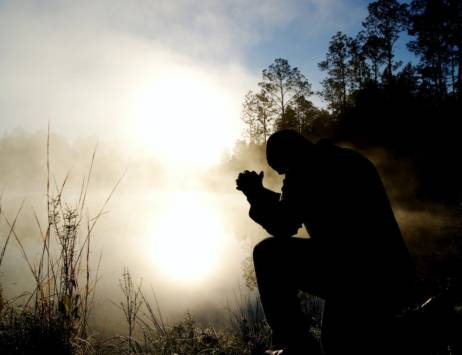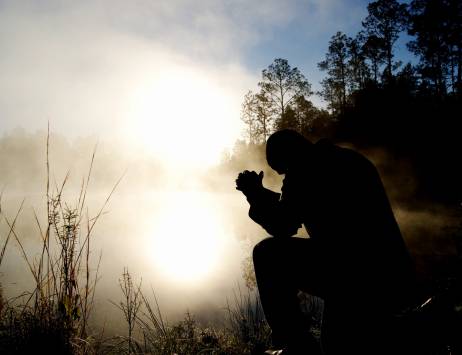I still remember the first time I talked with a Christian about fasting. It was the mid-2000s and Easter was coming up. My friend decided to fast for a couple of days ahead of Good Friday. He was pretty serious about it too.
No food at all. No soup. No juice. Only water (and black coffee).
The first day, from what he said, wasn’t too bad. The second was more challenging. But by the end, visions of sandwiches, donuts, and even salads danced through his head. Still, he pressed on. He was committed. And when evening came, he broke his fast with relish (and, also, relish).
But I don’t know that he got what he was hoping to out of the experience. Watching, I didn’t know what to think about it, especially as a new Christian at the time. But it did make me want to learn more about what fasting is, and how it benefits us as believers. And here’s what I learned.
First, fasting is an important practice of the Christian life.
Fasting as a Christian isn’t like fasting before your annual physical; it isn’t meant to cleanse your system of everything that could mess up your test results. And yet, there’s a similarity. Christian fasting is a spiritual discipline, which means it is a habit or practice that helps us to grow in our faith and turn to God for help in accomplishing our calling in the world. So in a sense, it does act to cleanse our system, to remove something from our lives that reduces our focus on what is most important.
Fasting was considered one of the key practices among God’s people up to the time of Jesus and beyond. Fasts were part of the ceremonial life of God’s people (Leviticus 16:29; 23:29). They were a natural response to different situations as well. Jesus’s own instruction on fasting treated fasting as a given. “When you fast” he said (Matthew 6:16). It wasn’t a question of whether or not we would fast, for Jesus, and for the whole of Scripture, it’s not considered optional.
It was, and is, something that we all should and must practice. The bigger question is how and for what reason.
Second, there isn’t one way—or one reason—to fast.
Okay, that’s not entirely true. There is one primary reason to fast, to focus on prayer. But there’s no one specific reason to be praying. In fact, there are many excellent reasons to do so, including:
- Worshiping God (Luke 2:37; Acts 13:2)
- Repenting of sin (Jonah 3:5-9; Joel 2:12)
- Preparing for ministry (Matt. 4:1-17; Mark 1:12-13; Luke 4:1-14; Acts 13:3-4)
- Expressing grief and sorrow (2 Samuel 1:12; Nehemiah 1:4)
- Petitioning for God’s help (2 Samuel 12:15-17; Esther 4:16; Daniel 9:3-5)
- Deliverance and protection (Psalm 69:10; Ezra 8:21-23)
- Seeking wisdom (Acts 14:23)
In the same way that there isn’t one reason alone for us to pray, there isn’t one method of fasting. Traditionally and most commonly, fasting is practiced by abstaining from food for a set period. But that’s not the only way you can fast. (And, if you have a medical condition that requires you to eat at regular intervals, abstaining from food is unwise.) Perhaps your fasting will mean abstaining from specific types of food, technology, television, or anything else that would be a genuine sacrifice to you. Regardless of what you’re abstaining from, the intent is the same: to devote your attention to the Lord.
Third, fasting is both private and communal
The Bible repeatedly shows fasting in two different contexts. It is a personal act, one that seems to be done principally in private outside of view from others (Matthew 6:16-18). But fasting is also done in community, with many praying and fasting as one body. The fasts prescribed in the ceremonial law show this. Also, Esther commands that all the Jews pray and fast, seeking God’s favor in the face of potential death (Esther 4:16). Church leaders devoted themselves to prayer and fasting before sending Paul and Barnabas on their missionary journey (Acts 13:2). The apostles and the whole church likewise devoted themselves to prayer, which undoubtedly included fasting (Acts 2:42-47). But whether in private or communal, fasting is not to be done for show—it is not meant to be used as a means of putting false humility on display. We are not to boast in our prayers about how often we pray, nor are we to roam around looking long-faced and in desperate need of a sandwich when we choose to fast (Matthew 6:16-18; Luke 18:12).
Worship through Fasting
I confess, I don’t fast as often as I probably should. It is a habit I am continuing to develop. But it is a habit I want to develop. It is an opportunity to worship the Lord through fasting, to remind myself that He is more important—that He provides for everything I could and do need. And that makes every attempt more than worth it.







1 reply on “Three Truths About Fasting”
Yea, fasting is one of the most important spiritual tools to entreat God for breakthroughs. I think many people already know this, but what we forget is even though we see its fruit we don’t dare to do it regularly! But life would be less troublesome and more energetic with regular fasting.